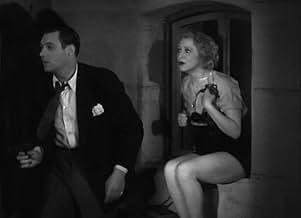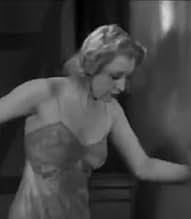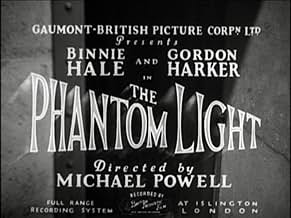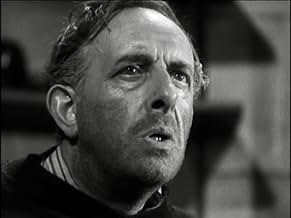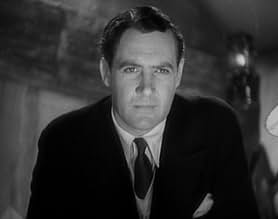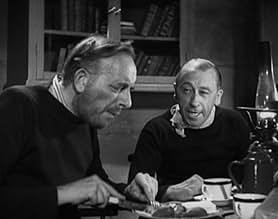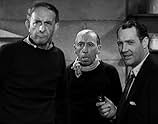अपनी भाषा में प्लॉट जोड़ेंA lighthouse keeper has been murdered in mysterious circumstances and, during the ensuing investigation a Phantom Light keeps appearing at the scene of his death.A lighthouse keeper has been murdered in mysterious circumstances and, during the ensuing investigation a Phantom Light keeps appearing at the scene of his death.A lighthouse keeper has been murdered in mysterious circumstances and, during the ensuing investigation a Phantom Light keeps appearing at the scene of his death.
Anthony Holles
- Mr. Mason
- (बिना क्रेडिट के)
Ernest Jay
- Railway Worker
- (बिना क्रेडिट के)
Vi Kaley
- Woman in Pub
- (बिना क्रेडिट के)
John Singer
- Cabin Boy
- (बिना क्रेडिट के)
फ़ीचर्ड समीक्षाएं
Very funny British Gainsborough Picture from 1935 with plenty of No-code 'damn' 'ruddy' and 'cor-blimey' -ies along with Binnie Hale's long legs and keen 'how about it' frankness, THE PHANTOM LIGHT is a bookend GHOST TRAIN fog bound mystery set on the shrouded eerie Welsh coast. The photography and settings particularly in the quaint railway scenes in reel one and the village scenes near the end offer the viewer genuine storybook pleasure in that they look completely fake but are not at all. It just happens to naturally all look like some plaster model. Lead actor, music hall star Gordon Harker has some hilarious lines - particularly the closing one: "Lummy! what a night" which would have rocked any Odeon theatre with gales of laughter. Binnie Hale is the Brit Joan Blondell, all perky and silly and ready to cut up her trousers all ready to gad about the lighthouse stairways in hotpants and high heels. Local Welsh eccentricness is on full display with plenty of Popeye style gnarling and eyeball flexing. I thought it was hilarious as (later famous) Director Michael Powell was clearly getting his actors to have fun with their roles. The local policeman is exactly like Constable Plod from the Noddy kids books..all tubby and bug eyed. It is all silly and very funny. The Warner bros pic SHH! THE OCTOPUS of 1935 is a good counterpart from the USA.
First off there is a very nice DVD of this mixed with some other British Thrillers. Looks and sounds good. That's great because the movie isn't too gripping and would dissolve with any distractions. The movie is an odd mix of "silent" movie acting and a long set up that takes up way too much time. The welsh village is fun and interesting--there are other later British films that have this same kind of small village opener with a stranger appearing and a mystery being resolved. It's a formula that works more often than not. But the movie fails to really evoke much spookiness of the lighthouse itself. It's never interested in generating any suspense for very long. Usually there is some very brief suspense moment, and it's just to set up more comedy. The comedy is fairly funny but no real sense of danger is generated. No sense of the story moving forward. There are also touches from (then trend setting) Russian montage editing that seem kind of comical in an unintended way. As you'd expect from director Powell there are a few nice camera moves and some good location photography. A music score would have helped this film there is none at all, perhaps a cost saving element? Or just a wrong choice? There are things to enjoy here but you have to get over the 30's cliché elements of "flapper girl" and "spunky-male-reporter" and these are pretty creaky indeed. A movie that, perhaps in a very director Michael Powell way, flirts around with various quirky and occasionally unexpected ideas but doesn't commit to any of them enough to become a whole anything. Other reviews of it being an OK time killer are valid.
With its wafer thin plot, this relies on the likeability of its cast and it's got just enough of that to make this entertaining from beginning to end. Gainsborough reused the story six years later as BACK ROOM BOY with Arthur Askey and although this won't be in anyone's top ten, it least it doesn't have Arthur Askey in it!
As naff as this is, I think I enjoyed it. I might even watch it again sometime. Why - because it was fun without being a comedy, exciting without being a thriller and watchable without being particularly well made. It relies on its two leads: Binnie Hale and professional cockney Gordon Harker. He's your typical grumpy but loveable cor blimey gov'nr cockney and he really carries this single handedly. He's also got some lovely old forgotten East End expressions. Surely it's time to resurrect this one: "I'll lay a pound to a sausage." It must mean something?
Just as I'm convinced that Genevieve Tobin is Joan Blondell's sister, Binnie Hale obviously must also be another sibling. She was an established actress on the stage but she hadn't quite mastered movie acting, nevertheless she's still better than a lot of established stars over in California. Looking at her, it's hard to believe she's actually the sister of Jessie Matthew's other half - whom, if you're familiar with Sonnie Hale - let's just say he didn't have the classic movie star looks! She's actually rather lovely (which you'd expect if she's Joan Blondell's long lost English sister!)
Some actresses have a magnetic screen presence because of their talent, Miss Hale might not exhibit a lot of talent but she certainly exhibits a lot of her legs - very nice legs too! Since Joseph Breen and his cohorts over in America had by 1935 banned anything remotely saucy, it fell on the shoulders of the British film industry to provide the public with a little bit of sexiness and Binnie Hale in shorts and negligee - not just a negligee but a wet negligee, certainly ticks that box.
Gainsborough in the early thirties didn't really do quality, they just made the sort of stuff you could veg out to with your brain switched off after a hard day's work. They were owned by Gaumont-British so had the same sort of relationship First National did to Warner Brothers. They made cheap simple, basic entertainment for the masses. So if you're not expecting too much from this, I'll lay a pound to a sausage that you might just enjoy it.
As naff as this is, I think I enjoyed it. I might even watch it again sometime. Why - because it was fun without being a comedy, exciting without being a thriller and watchable without being particularly well made. It relies on its two leads: Binnie Hale and professional cockney Gordon Harker. He's your typical grumpy but loveable cor blimey gov'nr cockney and he really carries this single handedly. He's also got some lovely old forgotten East End expressions. Surely it's time to resurrect this one: "I'll lay a pound to a sausage." It must mean something?
Just as I'm convinced that Genevieve Tobin is Joan Blondell's sister, Binnie Hale obviously must also be another sibling. She was an established actress on the stage but she hadn't quite mastered movie acting, nevertheless she's still better than a lot of established stars over in California. Looking at her, it's hard to believe she's actually the sister of Jessie Matthew's other half - whom, if you're familiar with Sonnie Hale - let's just say he didn't have the classic movie star looks! She's actually rather lovely (which you'd expect if she's Joan Blondell's long lost English sister!)
Some actresses have a magnetic screen presence because of their talent, Miss Hale might not exhibit a lot of talent but she certainly exhibits a lot of her legs - very nice legs too! Since Joseph Breen and his cohorts over in America had by 1935 banned anything remotely saucy, it fell on the shoulders of the British film industry to provide the public with a little bit of sexiness and Binnie Hale in shorts and negligee - not just a negligee but a wet negligee, certainly ticks that box.
Gainsborough in the early thirties didn't really do quality, they just made the sort of stuff you could veg out to with your brain switched off after a hard day's work. They were owned by Gaumont-British so had the same sort of relationship First National did to Warner Brothers. They made cheap simple, basic entertainment for the masses. So if you're not expecting too much from this, I'll lay a pound to a sausage that you might just enjoy it.
The Phantom Light is directed by Michael Powell and adapted from the Joan Roy Byford and Evadne Price play The Haunted Light. It stars Gordon Harker, Binnie Hale, Donald Calthrop, Milton Rosmer, Ian Hunter and Herbert Lomas. Cinematography is by Roy Kellino and music by Louis Levy.
Harker stars as lighthouse keeper Sam Higgins, who gets more than he bargained for when he takes up employment at the North Stack Lighthouse out on the foggy Welsh coast.
Some time before he formed half of the classic film making partnership with Emeric Pressburger, Michael Powell was a 1930s purveyor of the "quota-quickie" British movie. Not many of those films remain in print, thankfully this delightful blend of comedy and suspense is now in home format circulation. Out of Gainsborough Pictures, The Phantom Light harks back to a wonderful time of sincerity in film making, the acting mannerisms are as correct as the dialect (it's so nice to hear the term Michaelmas used), the locale is beautifully realised and maximum dramatic impact is garnered from the minimalist settings (three parts of the film is set in the lighthouse itself). Powell proves to be adept at eking out eerie atmospherics from the story, aided superbly by Roy Kellino's photography, while it's no small triumph to actually blend the comedy with the drama and not hurt the flow of the film.
Tan-y-Bwlch and lummee, what a night!
It's not perfect by any stretch of the imagination, Hale is annoyingly high pitched and shoe-horned into the fray, though her beautiful legs go up to her armpits and distract the red blooded amongst us, and the actual turn into the suspense realm comes, considering the running time, a bit too late in the story. But the faults are actually minor ones and they don't ultimately affect the enjoyment on offer for the classic film fan. It very much can be seen as a precursor and influence to the great Will Hay pictures, Ask A Policeman & Oh! Mr. Porter, and if you want links away from the thematics and plotting? Which are joyously similar, then Herbert Lomas was in Ask A Policeman and Louis Levy scored both. It doesn't have the slapstick that dominated the Hay movies, here the wit is dry and neatly pitched as polar opposites are thrust together under one lighted roof, but this is more a light hearted thriller than a comedy drama. With excellent locations used (Devon/Wales), and a director taking his early tentative steps to greatness (yes you read right), it's a film that has enough reasons to check it out regardless of story. As it is, it's pretty darn good anyway. And I'll be back to say the same thing after my next viewing at Michaelmas. 7.5/10
Harker stars as lighthouse keeper Sam Higgins, who gets more than he bargained for when he takes up employment at the North Stack Lighthouse out on the foggy Welsh coast.
Some time before he formed half of the classic film making partnership with Emeric Pressburger, Michael Powell was a 1930s purveyor of the "quota-quickie" British movie. Not many of those films remain in print, thankfully this delightful blend of comedy and suspense is now in home format circulation. Out of Gainsborough Pictures, The Phantom Light harks back to a wonderful time of sincerity in film making, the acting mannerisms are as correct as the dialect (it's so nice to hear the term Michaelmas used), the locale is beautifully realised and maximum dramatic impact is garnered from the minimalist settings (three parts of the film is set in the lighthouse itself). Powell proves to be adept at eking out eerie atmospherics from the story, aided superbly by Roy Kellino's photography, while it's no small triumph to actually blend the comedy with the drama and not hurt the flow of the film.
Tan-y-Bwlch and lummee, what a night!
It's not perfect by any stretch of the imagination, Hale is annoyingly high pitched and shoe-horned into the fray, though her beautiful legs go up to her armpits and distract the red blooded amongst us, and the actual turn into the suspense realm comes, considering the running time, a bit too late in the story. But the faults are actually minor ones and they don't ultimately affect the enjoyment on offer for the classic film fan. It very much can be seen as a precursor and influence to the great Will Hay pictures, Ask A Policeman & Oh! Mr. Porter, and if you want links away from the thematics and plotting? Which are joyously similar, then Herbert Lomas was in Ask A Policeman and Louis Levy scored both. It doesn't have the slapstick that dominated the Hay movies, here the wit is dry and neatly pitched as polar opposites are thrust together under one lighted roof, but this is more a light hearted thriller than a comedy drama. With excellent locations used (Devon/Wales), and a director taking his early tentative steps to greatness (yes you read right), it's a film that has enough reasons to check it out regardless of story. As it is, it's pretty darn good anyway. And I'll be back to say the same thing after my next viewing at Michaelmas. 7.5/10
I didn't expect much from this obscure film and that was the right approach.
The film's pace is a big letdown - it's consistently slow from beginning to end. The scriptwriters couldn't have been bothered with the development of the story, as it is never made clear what is going on.
Gordon Harker does quite well and tries his best to enliven the proceedings but it's all in vain.
क्या आपको पता है
- ट्रिवियाWhen Alice Bright (Binnie Hale) remarks that she had just been performing in a play, Sam Higgins (Gordon Harker) retorts, "East Lynne?" This is a reference to the oft produced play and movie of Mrs. Henry Wood's novel of the same name. "East Lynne" was enjoyed for its mad plot and frequently incomprehensible dialogue.
- गूफ़Sam Higgins arrives at Tan y Bwlch to take a boat to the North Stack lighthouse offshore. Both places exist but are about 60 miles apart. Tan y Bwlch is on the shore of a reservoir, not the sea, and North Stack lighthouse, on the isle of Anglesey, is onshore, not off.
- भाव
Alice Bright: Mr Higgins. I'm going to tell you the truth. I'm an actress, hiding from the police.
Sam Higgins: What, you act as bad as all that?
- कनेक्शनFeatured in Made in England: The Films of Powell and Pressburger (2024)
टॉप पसंद
रेटिंग देने के लिए साइन-इन करें और वैयक्तिकृत सुझावों के लिए वॉचलिस्ट करें
विवरण
- चलने की अवधि1 घंटा 16 मिनट
- रंग
- पक्ष अनुपात
- 1.37 : 1
इस पेज में योगदान दें
किसी बदलाव का सुझाव दें या अनुपलब्ध कॉन्टेंट जोड़ें


